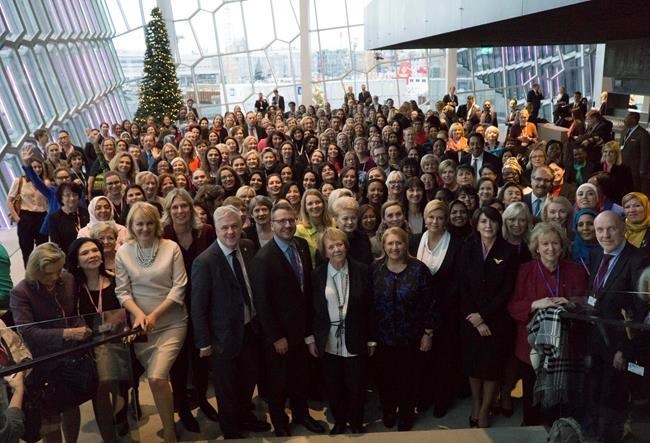
Delegates attending the Women Political Leaders summit in Reykjavik, Iceland pose for a group photo, Wednesday, Nov. 29, 2017. Over 400 women political leaders from around the world met in Iceland on Wednesday for an annual summit aimed at promoting gender equality inside and outside of the political sphere. (AP Photo/David Keyton)
Republished November 29, 2017 - 8:44 AM
Original Publication Date November 29, 2017 - 6:31 AM
REYKJAVIK, Iceland - Over 400 women political leaders from around the world met in Iceland on Wednesday for an annual summit aimed at promoting gender equality inside and outside of the political sphere.
The summit sponsored by the Women Political Leaders Global Forum comes amid the sexual misconduct scandal that has rocked the world of politics, as well as the entertainment and media industries.
In Iceland, often regarded as a champion of gender equality, hundreds of women in politics have signed a pledge against sexual harassment and urged male colleagues to change their behaviour.
Former Iceland President Vigdis Finnbogadottir, the world's first elected woman president, said the brave accounts given in recent weeks would improve the work environments for women in politics.
"This will change the attitude of both women and men," she said in a rare interview with The Associated Press on Monday. "Women will be more confident discussing with men, and men more careful."
Finnbogadottir became the world's first elected female president in 1980 after she defeated three male candidates. Women account for 7 per cent of world heads of state now.
Globally, the average share of women in national parliaments has risen slightly and stands at 23 per cent
Former New Zealand Prime Minister Helen Clark, who until recently led the United Nations Development Program, said work-related sexual misconduct of the kinds recently made public contributes to a lack of women in leadership positions.
"That kind of behaviour, which is now deemed widely unacceptable, has been one of the barriers to women getting ahead," Clark said. "Lots of sectors — parliaments, film industries and others — are having to face their past and say, 'We are going to do it better.'"
Clark said the conference was a rallying cry to show younger women that success is possible if they join the team and help others up that ladder.
The theme of the summit in Iceland's capital — "We can do it!" — refers to the country's success achieving gender equality.
Iceland has for nine years running been ranked by the World Economic Forum as having the smallest gender gap — an index measured by life expectancy, educational opportunities and other factors in addition to pay.
The World Economic Forum's most recent index, issued this month, concluded that men's earnings were rising faster than women's. Under current trends, it will take 217 years for women's incomes to match those of men, according to the forum's report.
Lithuanian President Dalia Grybauskaite, who chairs the Council of Women World Leaders, said the trend was worrying.
"This shows that even with the economy recovering — and better economic development in the world overall — the pay gap is increasing instead of diminishing."
At Wednesday's opening ceremony, Finnbogadottir, 87, received an honorary award and addressed the large gathering of female decision-makers.
The scene was in sharp contrast to her inauguration as Iceland's president 37 years ago, when she stood in front of a crowd dominated by men wearing tuxedos. Of the 150 officials attending the ceremony, only two were women.
"Gender equality has changed tremendously in Iceland since then but we still got some ways to go," she said.
___
This version has been corrected to show that World Economic Forum estimates it will be 217 years, not 99 years, before women have pay equity with men.
___
This version has been corrected to show that New Zealand's former prime minister said unacceptable behaviour was a barrier to women "getting ahead," not "getting a hit."
News from © The Associated Press, 2017